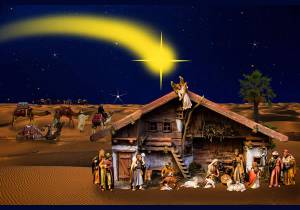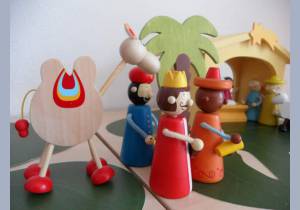Celebrating the Twelfth-day in Germany: dates, celebration, conventional congratulations, greetings, traditions and customs on the Twelfth-day
On this page you will find a description of the Twelfth-day festivities in Germany. Celebration dates by year, customs and traditions common for Germany on the Twelfth-day, a description of the origin, congratulations & greetings.
Dates for the Twelfth-day celebration in Germany
The date of the Twelfth-day celebration in Germany remains unchanged every year and falls on 6 January.
The Twelfth-day celebration date in Germany:
Tuesday 6 January 2026 .
Below is a list of dates for celebrating the Twelfth-day in Germany by year, provided that in previous and subsequent years the present practice and time of the holiday celebration is preserved:
- Monday, 6 January 2025 - Twelfth-day 2025Germany Germany
- Tuesday, 6 January 2026 - Twelfth-day 2026Germany Germany
- Wednesday, 6 January 2027 - Twelfth-day 2027Germany Germany
- Saturday, 6 January 2029 - Twelfth-day 2029Germany Germany
Other names of the holiday
Holiday name in German: Heilige Drei Könige.
Other names for the Twelfth-day in Germany:
- Epiphany
Holiday status in the territory of Germany
The holiday is an official extra non-working day only in the following federated states (lands) of Germany:
- Baden-Württemberg
- Bavaria
- Saxony-Anhalt
Wishes and congratulations, greetings on the Twelfth-day in Germany
- "Frohen Dreikönigstag" (Merry Feast of the Three Kings)
Description of the Twelfth-day celebration: customs and traditions:
Epiphany or the Feast of the Three Kings is a religious feast that in modern times refers to three events , described in the Gospels and associated with Jesus Christ: his birth, the coming to him of the Magi from the East, and his baptism. Although these events did not take place at the same time, or even the same year, this celebration combines them all. In Catholic and Evangelical theology, this feast is called "Epiphany," which means "appearanceб manifestation" and refers to the appearance of Christ into the world. This feast is always accompanied with pictures of the newborn Christ in the presence of his mother, Joseph, and the three kings. See below for information about the feast origins.
Earlier on this feast, children and adults wore the Magi costumes, took a star made for the feast, and walked from house to house; they told the Gospel story, sang a song, and collected gifts. This tradition continues to this day, with gifts accepted as sweets and money for themselves and children from poor families. In connection with this holiday, performances are played out in the theatre or puppet theatre, as well as in churches and are associated with the arrival of the Magi from the East.
Over time, this holiday has developed various customs and traditions, such as processions on the eve of the celebration to scare away evil spirits, and in some countries on this day a good fairy comes in through the fireplace chimney bringing gifts to the children.
The origin of the Twelfth-day holiday
The origin of the celebration dates back to the III - IV century AD. Although it is based on stories from the Gospels, it does not anyway correspond to them exactly. The Magi or astrologers, rather than kings, came to Jesus; their number is not named in the Bible, there is no reason to believe they were three, nor are they mentioned by name. Furthermore, there are grounds for believing that they came many months after the birth of Christ, not on the night of his birth. So the celebration is based rather more on legend than on the evangelical narrative. Originally the feast was introduced in honour of Christ's birth, and later, when the official holiday of Christmas was established on December 25 (interestingly, combined with or even adopted from paganism holiday of the sun rebirth), Epiphany has become an official holiday in honour of Christ's baptism and the memory of the Three Magi.
Photos, pictures for the holiday
To enlarge and view the picture, click on it with the mouse button.
-

The Three Kings Feast plot: the birth of Christ, the star, and the astrologers/ Magi from the East
-

Children's toys featuring the Three Kings Feast scenes
RU-GELD.DE Team
Last updated:

